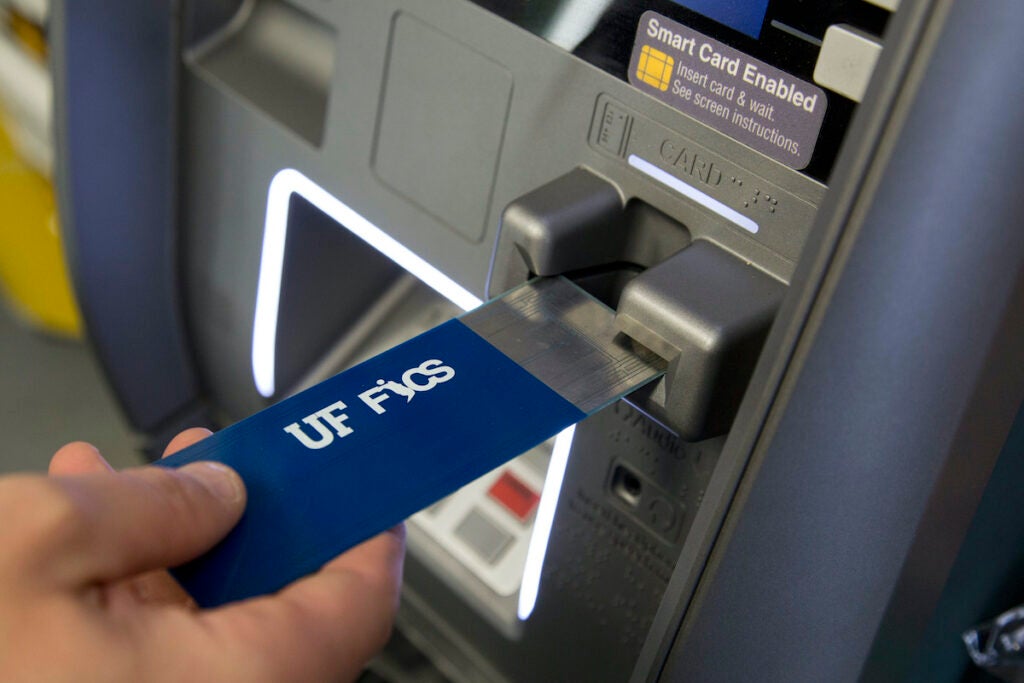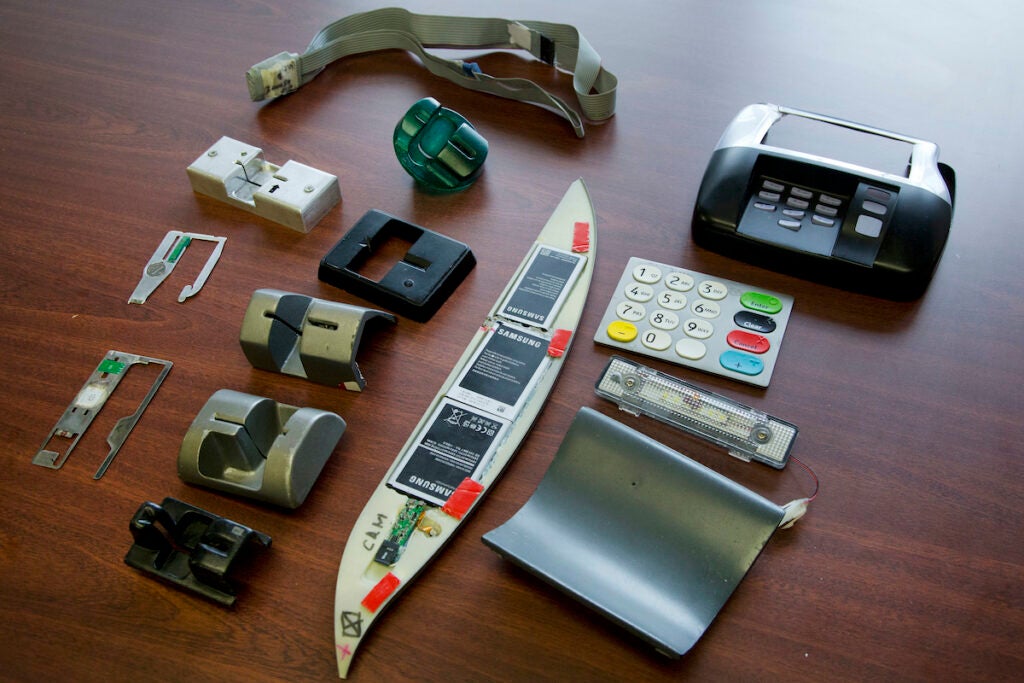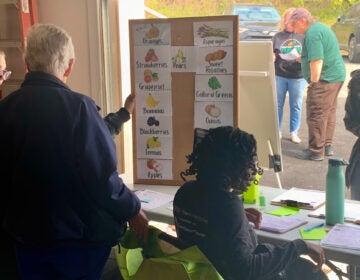‘Nothing they can do’: Scammers leave SNAP recipients without food assistance after Congress ends reimbursement
Thieves are able to steal public assistance funds on the state-issued cards because they lack security features credit and debit cards have.
Listen 3:47
Customer checking out groceries using SNAP benefits (Matt Rourke/AP)
From Philly and the Pa. suburbs to South Jersey and Delaware, what would you like WHYY News to cover? Let us know!
Delaware resident Zakiya Riddick said she realized her April food stamp benefits had been stolen when she went into a Newark convenience store to buy a beverage. She had been at one of the state’s social services centers seeking help to get her electricity turned back on when she drove across the street for something to drink.
Riddick said she received $1,000 from the Supplemental Nutrition Assistance Program, or SNAP, less than two weeks before, but the store register said she had insufficient funds for her purchase. When she checked her card, it showed a balance of just 90 cents.
SNAP card thefts
According to the Center on Budget and Policy Priorities, 117,000 Delawareans got assistance from the SNAP program last year. But they and others across the country who get public assistance like food stamps and cash assistance are facing an unrelenting threat. Scammers are using skimming devices to steal the card number and pin number through point of sale machines at stores and ATMs. The thieves then use that information to take money from victims’ accounts.
Riddick saw more than $800 in SNAP benefits stolen from her in a 30-minute span, with purchases made across Pennsylvania. That was money she planned to use to feed her four kids and granddaughter.
“I’ve heard it happening to people, but I’ve never had it happen to me,” Riddick said. “I’m one of those people that feel like, ‘Oh, that wouldn’t happen to me.’”
The government puts money on the card through what’s called an Electronic Benefits Transfer, or EBT. SNAP cards have a magnetic stripe and a pin. When swiped on a skimmed device, a criminal can access their card number and PIN code. They clone the cards and use them in other places and in other states.
Salam Bhatti is SNAP director at the Food Research and Action Center, a national nonprofit that advocates for people struggling against poverty-related hunger. He said they’ve seen a rise in benefit thefts, where criminals are targeting families who have the least.
“SNAP participants don’t typically find out that their benefits have been stolen until the next time they go to the store and they try to use it,” Bhatti said. “Unfortunately, they end up having to leave and go home empty-handed with no food.”
In 2024, Delaware SNAP recipients reported 2,154 claims of stolen benefits. The U.S. Department of Agriculture approved 1,975 of those claims and replaced more than $956,000.

Congress allocated funding to replace stolen benefits between October 2022 and the end of last year. But the federal government stopped reimbursing victims of scammers as of December.
In that time frame, Pennsylvania had more than 23,000 cases of SNAP benefit theft, according to a memo introducing legislation sponsored by state Rep. Dan Williams, D-Thorndale, that aims to reduce EBT card fraud.
Delaware Health and Social Services leaders said the department has already received 1,132 reports of theft totaling $166,308 so far this year. But with no replacement funds available, there is nothing for recipients to do except try to survive until their next month’s benefits come in.
Gilberte Pierre, a senior attorney with the Community Legal Aid Society, said last year they were able to get thousands of dollars in stolen benefits reimbursed for their clients. But now, Pierre said they can only advise victims to fill out a fraud claim, change the pin or request a new card.
“They have to wait another month until their benefits are replenished at that point,” she said. “They have to decide whether or not to pay for groceries, or ‘Do I pay for my rent and utilities? Or do I skip meals? Or do I put things on a credit card and incur more debt?’ So these are tough decisions that they’re faced with.”
Riddick said DHSS told her to contact food banks for help.
“There’s nothing they can do,” she said. “They’re telling me that I have to register for food banks and basically call the 211 number to find food banks, which is a little difficult because, again, I’m a single mom. I would have to basically call out of work or be late for work in order to make it to the food bank.”
There are apps that allow food stamp recipients to lock their EBT cards. Riddick said she had the locking feature on her card, but didn’t really understand how it worked. Bhatti said that while those are helpful, the ultimate answer is to outfit the cards with chips.
Chip-enabled EBT cards
“A SNAP card is essentially a glorified hotel key” without the security measures credit and debit cards currently have, Bhatti said.
Nearly 10 years ago, the private sector added chips to swipe cards to prevent fraud. Visa announced in June 2019 that, for retailers who had chip enabled payment systems, fraud declined 87% from September 2015 to March 2019.
Credit and debit cards also have additional security features, such as tap technology, a three-digit code on the back of the card and an expiration date.
USDA just finalized chip card standards for SNAP EBT cards last year. Former Agriculture Secretary Tom Vilsack sent a letter to governors in November urging them to invest in chip technology for food stamp cards.
Bhatti said making the transition will be a very costly process. A DHSS spokesperson said they are exploring implementing EBT chip cards. The timetable would depend on state and federal funding. Delaware has no pending legislation to address EBT thefts.
So far, only a couple of states are in the process of implementing chip EBT cards. California is currently rolling out chip cards to state residents enrolled in food and cash assistance programs. Oklahoma is also planning to issue EBT chip cards.
Pennsylvania considering chip EBT cards
Pennsylvania state Rep. Williams’ legislation would require the Pennsylvania Department of Human Services to work with the General Assembly to ensure an efficient transition to chip-enabled EBT cards. It would mandate the agency produce a report within six months that examines the anticipated costs to transition to chips for the commonwealth, retailers and participants.
“This is the worst kind of thievery,” Williams said. “One of the reasons why I think this legislation is so important is because we have heard the cries of people who have said ‘this has impacted my life in a way that is very difficult for me to recover from.’”
Oregon U.S. Sen. Ron Wyden, Pennsylvania U.S. Sen. John Fetterman and Louisiana U.S. Sen. Bill Cassidy are working to reintroduce legislation that would give states federal funding to issue chip cards. It would also require all states to move to chip only cards within five years, eliminating the magnetic stripe. Fetterman is also sponsoring legislation that would allow states to repay victims of SNAP skimming.

“This isn’t just theft—it’s taking food out of the mouths of kids, families, and seniors who rely on SNAP to get by,” Fetterman said in a statement. “And I’m pushing the White House to order USDA to follow through on the cybersecurity regulations Congress mandated in 2022. It’s long past time.”
SNAP recipients who are currently at risk of having their benefits stolen are also potentially at risk of losing them as well through federal program cuts. Congressional Republicans are proposing to dramatically reduce funding to the program by $290 billion in several ways, including by shifting more of the cost to states, expanding work requirements for adults without children and more stringent identity and income documentation requirements. It’s part of a budget plan to extend tax cuts approved during President Donald Trump’s first administration.
This story was supported by a statehouse coverage grant from the Corporation for Public Broadcasting.

Get daily updates from WHYY News!
WHYY is your source for fact-based, in-depth journalism and information. As a nonprofit organization, we rely on financial support from readers like you. Please give today.







